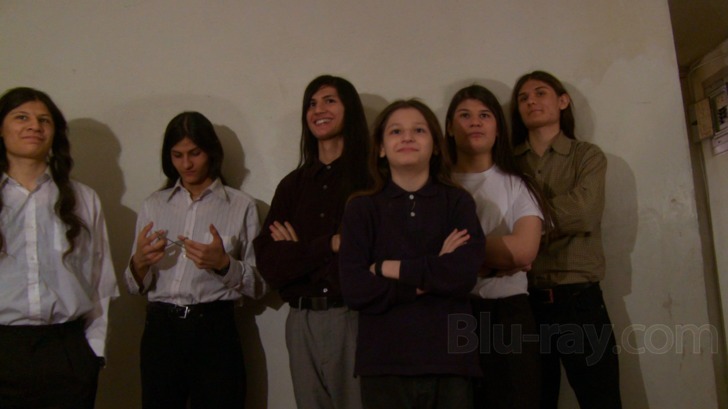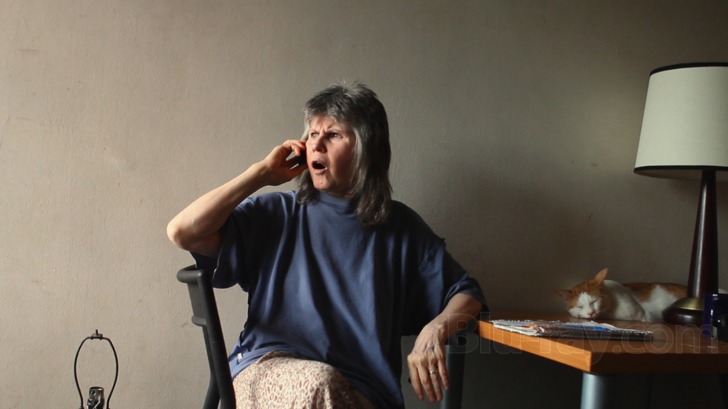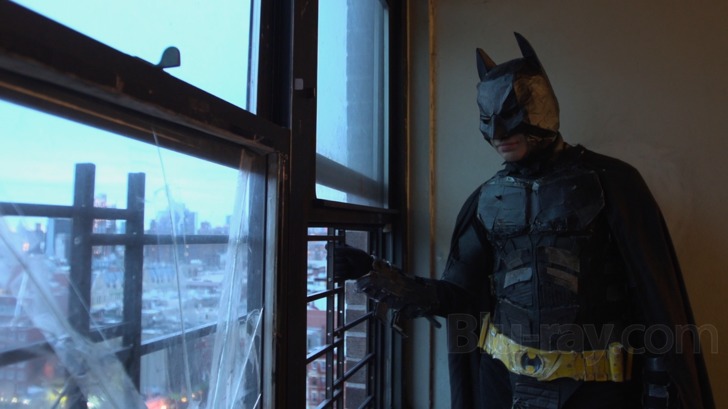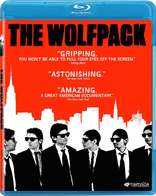The Wolfpack Blu-ray Movie
HomeThe Wolfpack Blu-ray Movie 
Magnolia Pictures | 2015 | 90 min | Rated R | Oct 20, 2015Movie rating
7 | / 10 |
Blu-ray rating
| Users | 0.0 | |
| Reviewer | 2.5 | |
| Overall | 2.5 |
Overview
The Wolfpack (2015)
Locked away from society in an apartment on the Lower East Side of Manhattan, the Angulo brothers learn about the outside world through the films that they watch. Nicknamed 'The Wolfpack,' the brothers reenact their favorite films using homemade props and costumes. Their world changes when one of the brothers secretly ventures outside the apartment.
Starring: Bhagavan Angulo, Govinda Angulo, Jagadisa Angulo, Krsna Angulo, Mukunda AnguloDirector: Crystal Moselle
| Documentary | 100% |
Specifications
Video
Video codec: MPEG-4 AVC
Video resolution: 1080p
Aspect ratio: 1.78:1
Original aspect ratio: 1.85:1
Audio
English: DTS-HD Master Audio 5.1 (48kHz, 24-bit)
Subtitles
English SDH, French, Spanish
Discs
50GB Blu-ray Disc
Single disc (1 BD)
BD-Live
Playback
Region A (B, C untested)
Review
Rating summary
| Movie | 2.0 | |
| Video | 3.5 | |
| Audio | 3.5 | |
| Extras | 3.5 | |
| Overall | 2.5 |
The Wolfpack Blu-ray Movie Review
Stranger Than Fiction—and Worse Told
Reviewed by Michael Reuben October 23, 2015Director Crystal Moselle's documentary, The Wolfpack, is about six boys confined by their father to an apartment on Manhattan's Lower East Side, where they were home-schooled by their mother and their knowledge of the outside world had to be garnered from movies. According to Moselle, she spent five years interviewing and shooting the six Angulo brothers and their parents, after one of the boys finally rebelled against his father's edict and ventured outside, sparking a family revolt. If true, the story is remarkable, but Moselle's film presents the history in such an odd way that it undercuts the very credibility of the tale it is attempting to tell. If she really shot for five years, either there's a lot of essential footage on the cutting room floor, or Moselle failed to establish basic facts. As if to camouflage the lack of clarity, she presents The Wolfpack as a kind of tone poem, without any of the customary guide posts such as names, dates or on-screen titles that might orient the viewer. Magnolia Pictures, which released the film, provided some of the omitted information in a press kit, but the strategy conveys the impression of damage control.

Moselle commits a critical error by failing to identify each of the six Angulo brothers, both initially and as they speak onscreen. This causes confusion not only because of the family resemblance, but also because their father, Oscar, though Peruvian by birth, gave all of his children names derived from the Hare Krishna faith, which are unusual to the average American ear. It's hard enough to remember the name of Mukunda Angulo, let alone recognize him as the unofficial leader of the group, the first to venture out into the great wide world of the Lower East Side on his own and also the one given the most screentime. Because the film was shot over a period of years, and because all of the brothers have the same waist-length hair, one might be pardoned for thinking that Mukunda is the oldest brother, but in fact he is the fifth of seven children. (The oldest is the family's only daughter, Visnu, who is barely mentioned in The Wolfpack.) Moselle never provides a birth order or, indeed, any chronology. We do learn from interviews with the boys' mother, Susanne, that she was a farm girl from the Midwest, who met and fell in love with Oscar while she was traveling with a group in South America. We also learn that it was Oscar's decision to move to New York City, while Susanne would have preferred somewhere with open spaces so that her children could grow up outdoors, as she did. It was also Oscar who insisted that the children remain indoors, disconnected from the outside world, allegedly for their own safety. And it was Oscar who, in a protest against society, chose not to work. How the family has supported itself is never fully explained, although there are references to Susanne's being certified as a teacher and paid for teaching her children. Anyone familiar with the economics of living in NYC and the statistics of the city's homeless population must seriously question whether such payments could support a family of nine, but Moselle never confronts the economic issue head-on. Moselle also exaggerates the extent of the family's confinement. By the time Papa Oscar established the boundaries of Fortress Angulo in May 1996, five of the seven children had already been exposed to the world. This is disclosed in the timeline included in the press kit, which states as follows:
- January 1990: Susanne and Oscar travel around the world
- April 1990: They go to live in a Hare Krishna Center in West Virginia
- October 1990: Visnu is born
- August 1991: Baghavan is born in West Virginia
- July 1992: Govinda & Narayana are born in West Virginia
- 1994: The family travels around the country in a van looking for opportunities for the father to become a rock star
- August 1994: Mukunda is born in Los Angeles while they are still living in the van
- March 1995: Family moves to NYC in the Bronx / Queens / Brooklyn because they hear that there is cheap housing. Gun shots are heard at their door and the parents are frightened for their children's safety.
- May 1996: Family moves to a housing project in the Lower East Side and the father forbids mother and children to go out on their own.
The Wolfpack Blu-ray Movie, Video Quality 

The Wolfpack was shot on portable video cameras by Moselle and a variety of operators. Post-production was completed on a digital intermediate, from which Magnolia Home Entertainment's 1080p, AVC-encoded Blu-ray was presumably sourced. The quality of the video footage varies with lighting conditions and shooting circumstances, but one of the advantages of HD digital video is that it can produce a reasonably sharp and detailed picture even under adverse conditions, so that one is always able to appreciate the rundown Angulo apartment, the details of their homemade props and costumes for film re-enactments, and the view of Delancey Street from their windows, where, the film suggests, the boys must have spent hours wondering about the world outside. The features and expressions of interview subjects are always clearly visible. Ranging from very good to at least serviceable, the image is no doubt as good as the source material will allow. Intercut with the new footage are VHS recordings made by the Angulo family themselves, including some of their early film re-enactments. The quality of these varies widely, but none of it can be any better than the standard definition source. Magnolia has mastered the disc with an average bitrate of 34.71 Mbps, which provides plenty of bandwidth to handle those portions of the film with major noise or distortion (e.g., the VHS tapes).
The Wolfpack Blu-ray Movie, Audio Quality 

The Wolfpack's 5.1 soundtrack, encoded in lossless DTS-HD MA, is a typical front-oriented documentary mix that emphasizes the voices of the interview subjects. The left and right speakers and, to a much lesser extent, the surrounds, are primarily used to supply the appropriate musical excerpts for the brothers' film re-enactments. There is also original scoring credited to Danny Bensi and Saunder Jurriaans (both of whom scored The Gift ) and Aska Matsumiya.
The Wolfpack Blu-ray Movie, Special Features and Extras 

- Interview with the Wolfpack (1080p; 1.78:1; 16:18): Unlike the film, this featurette identifies each brother as he speaks. They speak about meeting Moselle; their own reactions to the film and their excitement at having it released by Magnolia; their recent film acquisitions; lists of favorite films; and their current activities. If not for the Wolfpack tale, they could be ordinary teens.
- Interview with Director Crystal Moselle (1080p; 1.78:1; 6:37): Moselle describes how they met the family and how the family has changed during their acquaintance.
- Mirror Heart [A Short Film Directed by Mukunda Angulo] (1080p; 1.78:1; 6:35): Stylish and surreal.
- The Making of Mirror Heart (1080p; 1.78:1; 16:09): For the first Wolfpack production shot in a studio instead of the family apartment, Mukunda and his brothers build props and costumes, prepare a shot list, plan the lighting and camera moves and shoot scenes.
- Window Feel [A Short Film Directed by Mukunda Angulo] (1080p; 1.78:1; 6:26): This is the film on which the group is working at the conclusion of The Wolfpack.
- The Wolfpack Goes to Hollywood: First Trip to Los Angeles (1080p; 1.78:1; 20:04): The success of The Wolfpack on the festival circuit allowed the brothers to visit Hollywood, see places they'd only heard of and meet people whose names they'd only seen in credits, including David O. Russell and William Friedkin, who advises them never to move to Tinseltown.
- Theatrical Trailer (1080p; 1.85:1; 2:16): The trailer tells the entire story of the film in just over two minutes.
- Also from Magnolia Home Entertainment: The disc includes trailers for Steve Jobs: The Man in the Machine, Drunk Stoned Brilliant Dead: The Story of the National Lampoon, Sunshine Superman, Best of Enemies and Nowitzki: The Perfect Shot, as well as promos for the Chideo web service and AXS TV. These also play at startup, where they can be skipped with the chapter forward button.
- BD-Live: As of this writing, attempting to access BD-Live gave the message "Check back later for updates".
The Wolfpack Blu-ray Movie, Overall Score and Recommendation 

There's obviously an interesting story to be told about the Angulo family, but what emerges from The Wolfpack has zero indicia of reliability, accuracy or completeness. Moselle has described in interviews how she first encountered the six brothers on the street shortly after they had ventured out into the world, and how they instantly caught her attention and made her wonder who they were. After five years of filming, however, she hasn't manage to convey much more than that initial sense of a mystery about a group of adolescent boys who are hardly the best reporters of their history and circumstances. For all her supposed access to the family, Moselle remains a credulous outsider. Instead of documenting the Wolfpack, she's become the agent selling their story, complete with a storybook ending in the countryside. A technically proficient Blu-ray but a specious film.
Similar titles
Similar titles you might also like

Raiders!: The Story of the Greatest Fan Film Ever Made
2015

RBG
2018

Where to Invade Next
2015

Waiting for "Superman"
2010

Minding the Gap
2018

All the Beauty and the Bloodshed
2022

Fahrenheit 11/9
2018

An Inconvenient Sequel: Truth to Power
2017

I Am Not Your Negro
2016

Dinosaur 13
Director's Cut
2014

The Dog
2013

A Place at the Table
2012

Prohibition
2011

Marwencol
Special Edition
2010

American Experience: Freedom Riders
2011

And Everything Is Going Fine
2010

The Look of Silence
2014

The Great Buster: A Celebration
2018

Pressure Point
1962

Last Days in Vietnam
American Experience: Last Days in Vietnam
2014
